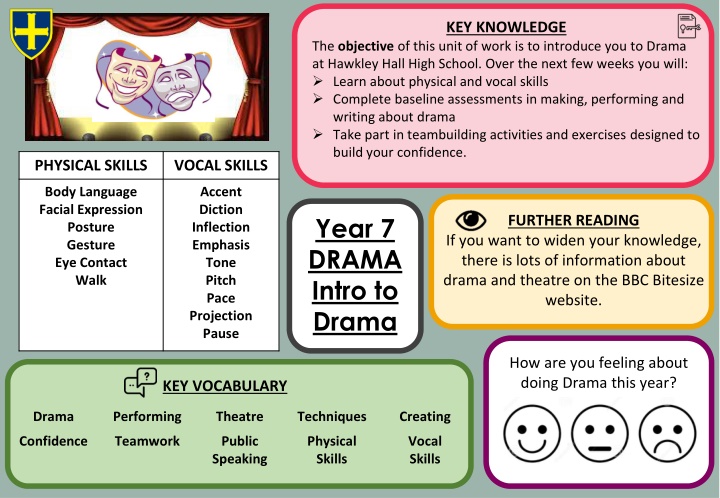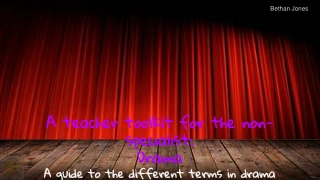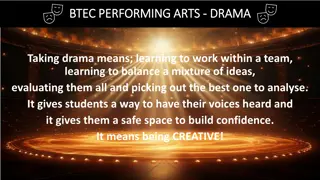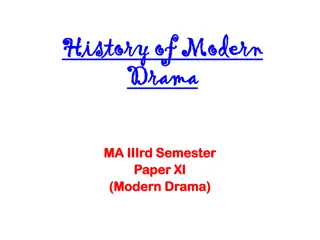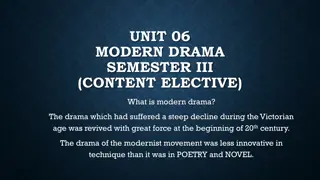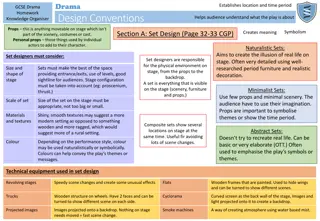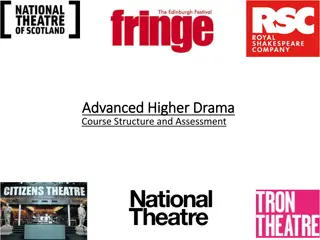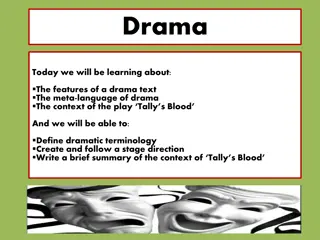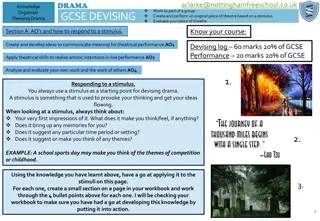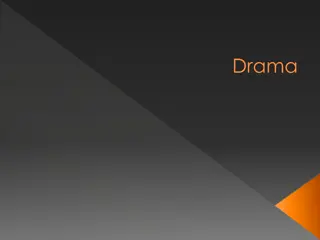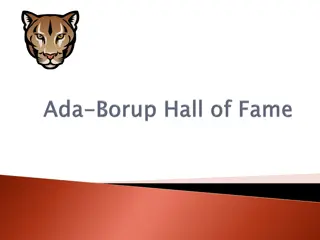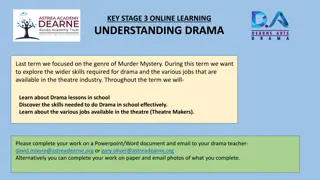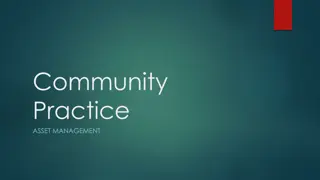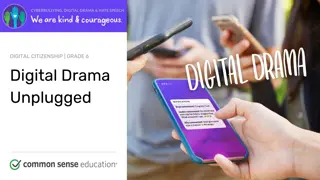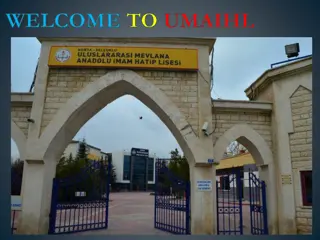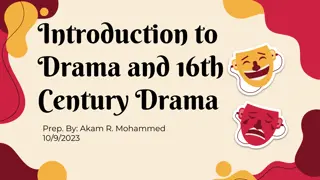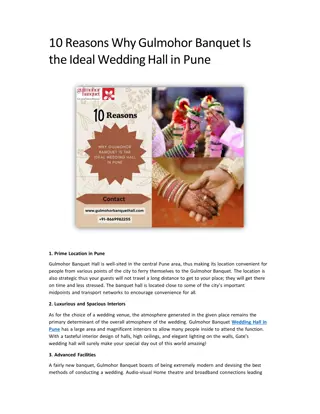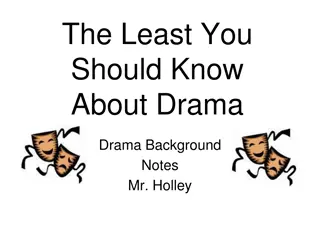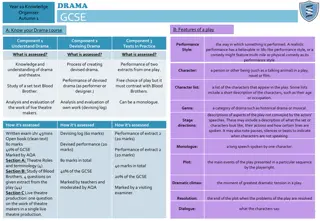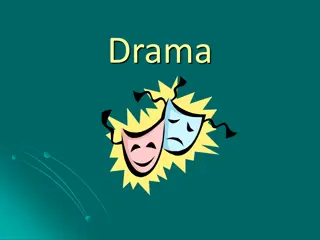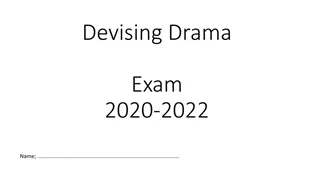Drama Introduction at Hawkley Hall High School
Introduction to Drama at Hawkley Hall High School focuses on exploring physical and vocal skills, participating in team-building activities, and developing confidence in drama. Students will learn about body language, facial expression, posture, gesture, accent, diction, tone, pitch, projection, and more. The unit also covers character development, script reading, and devising theatre, enhancing creative thinking and storytelling skills.
Uploaded on Oct 01, 2024 | 5 Views
Download Presentation

Please find below an Image/Link to download the presentation.
The content on the website is provided AS IS for your information and personal use only. It may not be sold, licensed, or shared on other websites without obtaining consent from the author.If you encounter any issues during the download, it is possible that the publisher has removed the file from their server.
You are allowed to download the files provided on this website for personal or commercial use, subject to the condition that they are used lawfully. All files are the property of their respective owners.
The content on the website is provided AS IS for your information and personal use only. It may not be sold, licensed, or shared on other websites without obtaining consent from the author.
E N D
Presentation Transcript
KEY KNOWLEDGE The objective of this unit of work is to introduce you to Drama at Hawkley Hall High School. Over the next few weeks you will: Learn about physical and vocal skills Complete baseline assessments in making, performing and writing about drama Take part in teambuilding activities and exercises designed to build your confidence. PHYSICAL SKILLS VOCAL SKILLS Body Language Facial Expression Posture Gesture Eye Contact Walk Accent Diction Inflection Emphasis Tone Pitch Pace Projection Pause Year 7 DRAMA Intro to Drama FURTHER READING If you want to widen your knowledge, there is lots of information about drama and theatre on the BBC Bitesize website. How are you feeling about doing Drama this year? KEY VOCABULARY Drama Performing Theatre Techniques Creating Confidence Teamwork Public Speaking Physical Skills Vocal Skills
KEY KNOWLEDGE The objective of this scheme of work is to develop your characterisation skills and ability to work with a script. The expected outcomes are: You can use your physical and vocal skills to become an old character You can use your physical and vocal skills to become a young character Develop your script reading skills and ability to follow stage directions KEY VOCABULARY Year 7 DRAMA When I m 64 FURTHER READING PHYSICAL SKILLS VOCAL SKILLS Research what life was like for children during World War 2 what games did they play? What would school have been like for them? Body Language Facial Expression Posture Gesture Eye Contact Walk Accent Diction Emphasis Tone Pitch Pace Projection UNDERSTANDING A SCRIPT Scripts have the names of characters listed down the left hand side, and their speech to the right (no speech marks!) this makes them easier to read when on stage. Stage directions are included in brackets (for the actor) or italics for the director.
KEY KNOWLEDGE The objective of this scheme of work is to develop your knowledge of devising theatre. The expected outcomes are: You understand what devising means You are familiar with the skills and techniques used to devise a piece of theatre You understand how to develop an idea from a stimulus Improve your creative thinking and story-telling skills. Year 7 DRAMA FURTHER READING Read about devising techniques and skills on the BBC Bitesize website. They have learner guides and videos too! Devising Why might you use a thought track or conscience alley in a piece of devised theatre? _______________________ _______________________ _______________________ KEY VOCABULARY Devising Stimulus Techniques Narrative Thoughts in the Head Angel & Devil Conscience Alley Thought Track Still Image Levels Hot Seating Blocking
KEY KNOWLEDGE The objective of this scheme of work is to develop your knowledge of physical theatre. The expected outcomes are: You are able to use physical theatre and acting to tell a story on stage You understand how to use the techniques of body as prop, mirroring and still image to convey meaning and enhance a performance. Develop your knowledge of transitions and use of tension to create precision and accuracy in a piece of abstract theatre. Year 7 DRAMA Physical Theatre FURTHER READING Splendid Theatre Stomp! Physical theatre Practitioners Watch some pieces of physical theatre on YouTube. Try searching for: - Chair duets - Physical Theatre Machine Push DV8 Complicite Frantic Assembly KEY VOCABULARY Why do you think some theatre companies choose to use physical theatre? _______________________ _______________________ _______________________ Physical Theatre Theatre that focuses on the body and movement Tension Tension in an actors muscles creates precision. Body As Prop Use of the body to create props/objects Unison Moving/speaking at the same time Ensemble A group of actors who work closely together Soundscap e Using the body and voice to create sounds.
KEY KNOWLEDGE In this unit of work you will study the play Bugsy Malone . You will have the chance to practically explore some of the scenes, focussing on developing your accent, blocking and characterisation skills. You will also be introduced to some technical aspects of the theatre, such as set design, costume design and marketing a live production. You will learn new technical terms and this unit will widen your knowledge of theatre in general. Year 7 DRAMA Bugsy Malone FURTHER READING 1. Research New York in the 1920s 2. Watch the full version of Bugsy Malone on YouTube! Although Bugsy Malone is about 1920s mobsters, all of the characters are played by children. Why do you think this is? ___________________________ ________________________ ________________________ _______________________ KEY VOCABULARY Characterisation Accent Genre Blocking Director Atmosphere Backdrop Flat Props Set Design Material Costume Symbolic Marketing Actor
